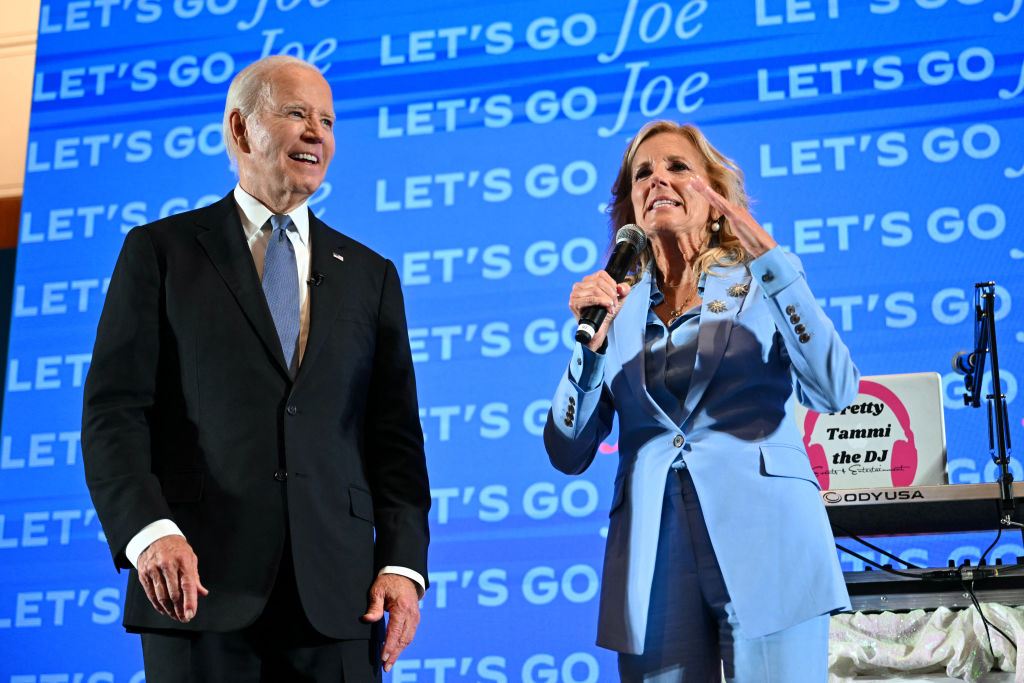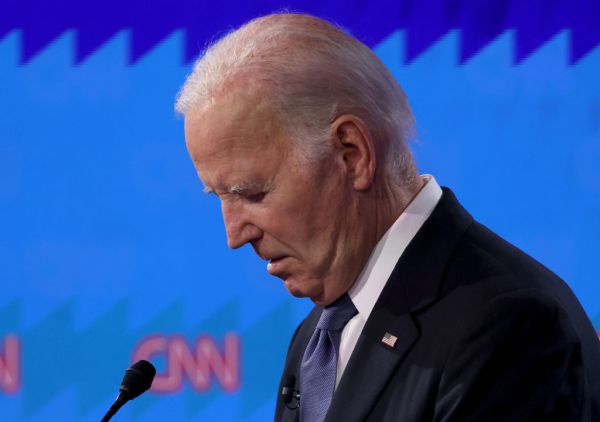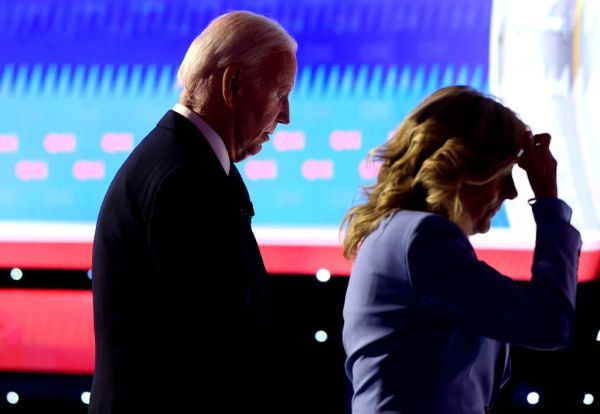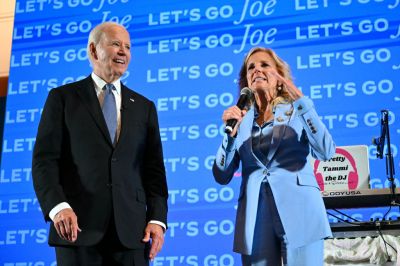
Let’s start with the stipulation that President Joe Biden can’t be kept from the Democratic presidential nomination if he is determined to accept it.
The president has won 3,894 of 3,937 available pledged delegates—nearly 99 percent. Even if party leaders universally agreed Biden should be replaced, the rules make it almost impossible to do so.
Democratic National Committee bylaws state: “Delegates … shall in all good conscience reflect the sentiments of those who elected them.” This “good conscience” clause could theoretically allow delegates to vote for someone other than Biden on the grounds that he is too infirm to serve another term.
So, yes, it’s possible that if the bulk of the party turned against him that at least 1,919 of Biden’s delegates—enough to hold him under the 1,976 he needs to win—could join a mass movement to vote their conscience and throw open the nominating process. But that seems extremely unlikely.
Making such a possibility even more remote is that the DNC plans to nominate Biden before the Chicago convention that begins on August 19. Purportedly to comply with Ohio’s 90-day ballot deadline, Biden will be nominated via “virtual roll call” that will take place by August 7 at the latest. All the work of organizing the rebellion would have to be done remotely, not up close and personal at the convention. This was, I assume, part of the reason that the Biden DNC glommed on to the virtual nomination, and stayed glommed even after Ohio changed its deadline and the threat had passed.
That’s all a long way of saying that unless Biden steps aside, there’s no clean way to take the nomination away from him.
But what if someone tried … or at least threatened to?
Thursday’s debate was even worse than we feared, and I certainly feared it would be pretty bad. But the magnitude of the Democratic freakout would still seem excessive, unless we understand it in its proper context.
For four years, Democrats have been hyping themselves up to believe that Biden isn’t really too enfeebled to be president. And for the past year particularly, it has been increasingly hard work. We didn’t see anything on the debate stage that we hadn’t been told by those in a position to know or been able to observe ourselves. But at each point, Democrats sucked it up and said “Yes, but this is our best shot …”
The freakout isn’t all about the debate performance, but the debate performance was so obviously bad and at such an important event, the Democrats who had felt obliged to stifle their anxieties publicly were finally free to give them voice, or give them voice again.
The freakout flood wasn’t in response to the debate, per se, but the debate breached the dam that had been holding it all back. And as each Democrat joined the flow, others felt emboldened to do the same.
When the New York Times’ editorial board wrote “It’s too big a bet to simply hope Americans will overlook or discount Mr. Biden’s age and infirmity that they see with their own eyes,” it was saying something many of its members have no doubt believed for a long time, but now felt able—obliged, even—to say.
Yes, the most likely scenario is that Democrats will yet again rebuild the earthworks and the great wash of conventional wisdom for Biden to drop out will slow and return to little rivulets of dissent seeping out of a yet-still-weakened barrier. Indeed, the best bet would seem to be that Biden survives this, but never quite manages to stop the leakage of support. Words like those written by the Times will fade but never be erased.
Let’s consider, though, the less likely scenario. That’s the one in which when Washington returns from the Independence Day recess, Biden’s performance in the polls is living down to the fears being expressed publicly by the press and privately by Democratic elected officials and party leaders. Let’s say that Biden is down 10 points by mid-July.
What might happen then?
On August 7, 1974, Republicans Sen. Barry Goldwater, House Minority Leader John Rhodes, and Senate Minority Leader Hugh Scott went to the White House and told President Richard Nixon not so much that he should resign, but what they would do if he didn’t. They told Nixon that when the House inevitably impeached Nixon for lying about the Watergate break-in and obstructing the investigation into the crime that he would be convicted and removed with the support of Republicans in the Senate.
Shortly after the meeting, but before Nixon announced his resignation the next day, Goldwater told reporters that the issue of resignation “never came up.”
“I don’t think it would be proper for me to say what I think,” Goldwater said at the time. “And, anyway, I’m not sure the president would pay much attention.”
Goldwater and company were not there to tell Nixon what he should do, but rather what they would do: leave him to his fate and inevitable removal from office.
Imagine now that this summer, 50 years later, a group of similar Democratic solons carried a similar message to Biden. Not that he should drop out, but what they would do if he did not: withdraw their endorsements of him and urge the Democratic National Committee to write new rules for the convention unbinding the delegates.
A lot of the speculation about how Biden might be gotten out of the race centers on whether former President Barack Obama might be the one to nudge Biden. That seems unlikely to work given the nature of their relationship. Or that first lady Jill Biden should be the one to make her husband see the light.
But for Biden, a creature of Congress, personal persuasion doesn’t seem to be the right approach. The right emissaries would seem to be respected former colleagues and legislative leaders. Imagine Senate Majority Leader Chuck Schumer, Senate Majority Whip Dick Durbin, and Rep. Jim Clyburn taking the message to Biden not that he should go, but that they have left him.
Again, this is not the most likely scenario. There’s not a lot of reason to think that in an era when Republicans couldn’t stand up to Trump in the aftermath of January 6, 2021, that the other party would be so brave as to do the same to a president from their own team. After all, Republicans are right now feeling a lot better about knuckling under to Trump and, after all, Biden’s unfitness is a matter of decline, not design. Doing nothing and hoping for the best—or at least avoiding the blame—is always appealing.
But it is hardly fantastical to think that Democrats in 10 days or two weeks will view pushing Biden out as risky, but that sticking with him means certain defeat.
Then what?
If the president were to drop out before being formally nominated by Zoom sometime in the next six weeks, all his delegates would suddenly become “unpledged” and free to support whomever they wish. Poof.
Should he decide to endorse another candidate, the president would undoubtedly have sway with some of his former delegates, but they can ultimately support anyone. There is no mechanism by which Biden’s delegates would automatically “transfer” to Vice President Kamala Harris. She would have to win at the convention, the same as any other candidate.
But then comes the revenge of the superdelegates. Deemphasized after the contentious 2016 Bernie-Hillary primary, these 700 or so party insiders no longer vote on the first ballot at the convention, unless the outcome is assured (as it would be, should Biden stick around).
But if no candidate receives the requisite delegates, as would seem likely in an open convention, then the superdelegates would participate in the second round of voting. These insiders’ insiders could deliver more than a third of the needed delegates to a favored candidate, maybe Harris or maybe someone else. Maybe even someone you’re not thinking about right now.
It’s a scary prospect for Democrats to think about what might come out of an open convention, no doubt. But, if in two weeks time, the Biden team hasn’t rebuilt the reservoir to hold in all these anxieties, the raging waters of uncertainty may look a lot more appealing than being sunk with the incumbent.
Holy croakano! We welcome your feedback, so please email us with your tips, corrections,
reactions, amplifications, etc. at STIREWALTISMS@THEDISPATCH.COM. If you’d like to be considered for publication, please include your real name and hometown. If you don’t want your comments to be made public, please specify.
STATSHOT
Biden Job Performance
Average approval: 39.4%
Average disapproval: 57.2%
Net score: -17.8 points
Change from one week ago: ↓ 4.2 points
Change from one month ago: ↓ 0.4 points
[Average includes: New York Times/Siena: 35% approve-61% disapprove; Quinnipiac: 36% approve-59% disapprove; Gallup: 38% approve-58% disapprove; Fox News: 45% approve-55% disapprove; NPR/PBS/Marist: 43% approve-53% disapprove]
General Election
Donald Trump: 42.0% (↑ 0.2 points from one week ago)
Joe Biden: 40.0% (↓ 0.4)
Robert F. Kennedy Jr: 9.2% (↑ 0.4)
[Average includes: Quinnipiac: Trump 43%-Biden 37%-Kennedy 11%; New York Times/Siena: Trump 40%-Biden 37%-Kennedy 7%; Fox News: Trump 42%-Biden 43%-Kennedy 10%; NPR/PBS/Marist: Trump 42%-Biden 41%-Kennedy 11%; Echelon Insights: Trump 43%-Biden 42%-Kennedy 7%]
TIME OUT: THE SWINE DIVINE
Taste: “Below the swarming [South Bronx] network of weekend commuters, Chef Angel Jimenez is prepping for a day of service at his one-of-a-kind restaurant slash weekly block party, La Piraña Lechonera. … He’s an organic, extroverted showman; his resting speed is most people’s 150 miles per hour. He’s instantly warm and familiar with strangers, loud and gregarious. … And, during the warm weather months for the last 23 years, on Saturdays and Sundays, he sells roast pork out of a trailer he bought off a friend and modified himself to serve as a makeshift kitchen. … Every Friday during baseball season, Angel picks up four or five 120- to 150-pound whole pigs from Hunts Point. … Around 4 a.m. on Saturday and Sunday mornings, six to twelve chunks of pig on four sheet pans go into an old double-decker Blodgett bread oven on the sidewalk. … He begins selling plates at 12:30 p.m., and by 5 or 6 in the afternoon each day, both pigs will be gone.”
TWO YEARS SINCE DOBBS, DEMS DOUBLE DOWN ON SCOTUS
New York Times: “A Democratic-leaning group announced on Monday the beginning of a seven-figure campaign to focus voter attention on the importance of the Supreme Court in the presidential election. … The group, Stand Up America, is kicking off the $1 million campaign on the second anniversary of the Dobbs v. Jackson decision. … For years, Republicans have made the courts — especially the Supreme Court — a central issue in federal elections. … This year, Democrats are trying to harness that same energy. The campaign comes as President Biden has been increasingly vocal about the role of the Supreme Court in recent campaign stops. … At a fund-raiser in Los Angeles this month, Mr. Biden said that ‘the next president is likely to have two new Supreme Court nominees.’ … Mr. Trump has been less direct in his statements about the Supreme Court, commenting on the judicial branch mostly in relation to his criminal trials.”
Team Trump hopes Kemp offers Georgia boost: Wall Street Journal: “Republican operatives here are betting Georgia’s popular governor and his stewardship of the state’s robust economy will help former President Donald Trump undercut President Biden’s significant early investments in the state. … Perhaps the biggest wild card is the involvement of Gov. Brian Kemp, whom Trump has made an enemy. … The two Republican leaders haven’t spoken in years. … Josh McKoon, chairman of the Georgia Republican Party, said he expected Kemp, despite the ugly history with Trump, to play a critical role in helping the former president this year. … Polling shows Trump leading in Georgia as voters expressed dissatisfaction with Biden on a range of issues, such as immigration and inflation. A Quinnipiac University poll, conducted between May 30 and June 3, showed Trump leading Biden 49% to 44%. Republican strategists think that Trump’s path to victory would get easier if he embraced Kemp.”
SENATE DEMS MIND THE GAP WITH BIDEN
Axios: “Democratic Senate candidates continue to run ahead of President Biden in battleground states, a polling spread that presents acute challenges — and opportunities — for both parties. … It also raises critical questions for the 2024 election: Whether Democrats can fix the lack of enthusiasm for Biden — or whether he'll drag down other Democrats on the ballot. … In the last two presidential elections, only a single Senate candidate — out of 69 races — won a state that their presidential nominee lost. … In Arizona, Michigan, Nevada, and Pennsylvania, Trump leads, while the Republican Senate candidates have clear deficits. … It's hard to argue that polling is fundamentally broken …if multiple surveys show Democratic candidates maintaining persistent leads in toss-up states as Biden lags in them. Republicans plan to spend heavily to ensure there's no daylight between Democratic candidates and Biden. They also argue that their candidates are still relatively unknown.”
Sheehy tries to nationalize race against Tester: Politico: “Montana Republican Tim Sheehy is getting some key backup in his bid to oust Sen. Jon Tester. More Jobs, Less Government, a super PAC with ties to Sen. Steve Daines (R-Mont.), is launching a $4 million TV and digital ad buy Wednesday that will run for about a month. … The campaign has four spots that yoke Tester to both President Joe Biden and Senate Majority Leader Chuck Schumer. … To pull off [a win], Tester will need to create some distance from the national Democratic Party and its unpopular presidential nominee. Republicans are seeking to use Tester’s party affiliation to sink his reelection bid. … Sheehy could use the outside help. Tester and allied groups have been greatly outspending Republicans on ads over the past two months.”
While Tester plays defense on the border: New York Post: “Sheehy has consistently attacked Tester on immigration and border security – seeking to paint him as an enabler of President Joe Biden’s record on illegal immigration from Mexico – forcing Tester to defend his record. … Sheehy’s focus on the border reflects a larger strategy for Republican Senate candidates in battleground states across the country, who have emphasized the issue. In April, a campaign arm of the Senate Republican Conference announced it would spend $15 million attacking Tester on immigration this election. … Tester, for his part, has played up the contrast between himself and Biden on this issue. … ‘I’ve stood up to Biden by demanding action to secure our border and protect Montana’s way of life,’ Tester wrote on Twitter. … Tester has also touted his support of a bipartisan border security bill introduced in the Senate in February.”
HOUSE GOP LAYS OUT DEMOCRATIC TARGETS
Politico: “House Republicans’ campaign arm will book nearly $46 million in advertising this fall as it seeks to grow the narrow majority the GOP won in the midterms. The reservations will include TV and digital ads across 22 districts in 29 media markets. … More than a quarter of the total spending will be marshaled against the five Democrats in districts that then-President Donald Trump won in 2020: Reps. Jared Golden in Maine, Marie Gluesenkamp Perez in Washington state, Mary Peltola in Alaska, Marcy Kaptur in Ohio and Matt Cartwright in Pennsylvania. … The NRCC will also spend $2.7 million in open seats in Michigan currently held by Reps. Dan Kildee and Elissa Slotkin. … The House map has a much smaller number of competitive districts since the post-2020 redistricting. … So Republicans are also looking to defend their most vulnerable incumbents, including a slew of seats in New York and California that Joe Biden won in 2020.”
BRIEFLY
Squad down a member after Rep. Jamaal Bowman trounced in primary—Lohud
Rep. Lauren Boebert earns GOP nod after district switch—Denver Post
Ex-CNN anchor John Avlon wins Dem primary in competitive Long Island district—Politico
WITHIN EARSHOT: THOU SHALT TROLL SO HARD
“I can’t wait to be sued.”—Louisiana Gov. Jeff Landry readies for legal challenges to a bill he signed that places the Ten Commandments in all public classrooms.
MAILBAG
“From your reply to Mr. Watkins in the Mailbag—‘I would caution you that partisanship is some powerful business. In 2020, just one state, Maine, split its Senate and presidential votes, going for President Joe Biden by 9 points and reelecting Republican Sen. Susan Collins by a similar margin.’ So how about a discussion of the current split in polling between Biden vs. Trump and incumbent Democrat senators vs. Republican challengers? Will the popular senators have reverse coattails and pull Biden over the line in swing states or will Biden pull down incumbents and give Republicans substantial gains in the Senate? Trump leads Biden by 2.3 in Pennsylvania, where Casey leads McCormick by 6-8. It is hard to imagine a Trump/Casey or Biden/McCormick voter so I tend to think Biden wins this state. Trump’s challenge in Michigan and Wisconsin seems even more daunting. His lead over Biden is smaller in both states and the Democrat senators are polling well. Even Arizona where Trump apparently has a commanding lead raises the question of how there could be a significant Trump/Gallego vote. So I am thinking the Republicans pick up the Arizona Senate seat by the skin of their teeth while Biden scrapes out a narrow electoral college win in the rustbelt swing states. Not sure anything else is in play but would love to read your assessment.”—Peter Sperry, Greenville, South Carolina
Mr. Sperry,
The conventional modern meaning of “reverse coattails” is the idea that down-ballot candidates help the top of the ticket. There’s another understanding of it—that reverse coattails means hurting the candidates of the same party on the ticket.
Down-ballot candidates do frequently help the top of the ticket, but it is often more organizational than attitudinal. A presidential candidate would benefit, for example, by a hotly contested congressional race in a swing state if it meant that the candidate of her or his party would be multiplying get-out-the-vote efforts, multiplying campaign ad spending, and keeping voters engaged.
But while Senate candidates often outperform presidential ones, I can’t think of many, if any, recent instances where the Senate candidate bailed out a losing presidential candidate. There will be a number of Ohioans who vote for both Sen. Sherrod Brown and Trump, just as there will be Floridians who vote for President Biden and Sen. Rick Scott. It’s harder to imagine a persuadable voter, though, who is inclined to vote differently on the presidential level because of his or her Senate preference. Again, a presidential campaign might piggyback on the turnout efforts of a state-level candidate, but not for persuasion. Indeed, there’s evidence to suggest that it works the other way: Voters might prefer divided government, and split their ticket accordingly. If they’re voting to return Trump or Biden to power, voters might want to keep them in check with a Senate of the opposite party.
But motivation can work in reverse, too. The way presidential coattails of any length work is that the big contest changes the composition of the electorate and helps or hurts those beneath. If, for instance, Democrats think that Biden is doomed, they have less motivation to go out and vote, depriving his fellow Democrats of core support they need to even get to a place where they can start working on bringing over the ticket splitters.
All best,
c
“As an Ohio voter who leans Republican and followed the Senate primary fairly closely I was kind of surprised you didn’t slot Bernie Moreno in as a flaky candidate along with Kari Lake. Character and his stance on entitlements are two of my major problems with him. I hope the Republicans win the majority, but I can’t bring myself to vote for a Trump sycophant like Moreno.”—Huston Harrah, Logan Ohio
Mr. Harrah,
I am sure that there are many more candidates ( in both parties) who actually are flakes. The question is whether voters know it.
Since winning the Republican nomination, Moreno has seemed to be trying to run a pretty conventional kind of Senate campaign. This is perhaps not a surprise given his origins in a politically connected and wealthy family. It is possible that Moreno was faking some of his mega MAGA energy to try to win the primary. Now we get to find out if he was a fake flake or a real one.
I promise we will keep tabs.
All best,
c
You should email us! Write to STIREWALTISMS@THEDISPATCH.COM with your tips, kudos, criticisms, insights, rediscovered words, wonderful names, recipes, and, always, good jokes. Please include your real name—at least first and last—and hometown. Make sure to let us know in the email if you want to keep your submission private. My colleague, the multi-tasking Nate Moore, and I will look for your emails and then share the most interesting ones and my responses here. Clickety clack!
CUTLINE CONTEST: 'I GUARANTEE YOU THERE'S NO PROBLEM'

Sometimes, it just pays to keep it simple. Many of our entrants this week zeroed in on former President Donald Trump’s splayed hand gesture. Some used elaborately Trump-y language to imagine what he was describing, but the winner left it to the reader’s imagination:
“It was this big.”—Brett Houseman, Vista, California
Winner, Regrets, We’ve Had a Few Division:
“Having concluded his own, Biden stiffly appraises the Trump rendition of ‘My Way.’”—Bill Ward, St. Augustine Beach, Florida
Winner, Prescient Humor Division:
“Joe! Over here!”—Susan Carusi, Brentwood, Tennessee
Winner, Almost Lifelike Division:
“Disney and Madame Tussauds announce first collaboration for Hall of Presidents.”—Kevin Hodge, York, Pennsylvania
Winner, Ask Your Doctor Division:
“Tonight’s debate is sponsored by Neuriva and Prednisone.”—Tripp Whitbeck, Arlington, Virginia
Winner, the Company You Keep Division:
“Come on Joe, I tried, Jeffrey just didn't want you on the island.”—Bob Goldman, Gilroy, California
IT’S A VIBE
Washington Post: “By Monday morning his head was gone, his left leg was separated from his torso and his right foot was a blob. Wax Abe Lincoln, it turns out, was no match for Washington’s punishing heat wave. The six-foot-tall statue of America’s 16th president, meant to draw attention to the Civil War era and its aftermath, was placed under towering trees sure to provide ample shade in summer. … That was the thinking, anyway. Instead, three consecutive days of temperatures exceeding the mid-90s laid waste to wax Lincoln. … Slumping Abe in heat-induced agony was one interpretation of the meme-makers. Slumping Abe in carnal ecstasy was the suggestion of those hawking more scandalous versions. No matter how people saw it, there was no ignoring what the heat had wrought. … A wire spoke that kept the former president’s head in place was all that remained.”
Nate Moore contributed to this report.






Please note that we at The Dispatch hold ourselves, our work, and our commenters to a higher standard than other places on the internet. We welcome comments that foster genuine debate or discussion—including comments critical of us or our work—but responses that include ad hominem attacks on fellow Dispatch members or are intended to stoke fear and anger may be moderated.
With your membership, you only have the ability to comment on The Morning Dispatch articles. Consider upgrading to join the conversation everywhere.